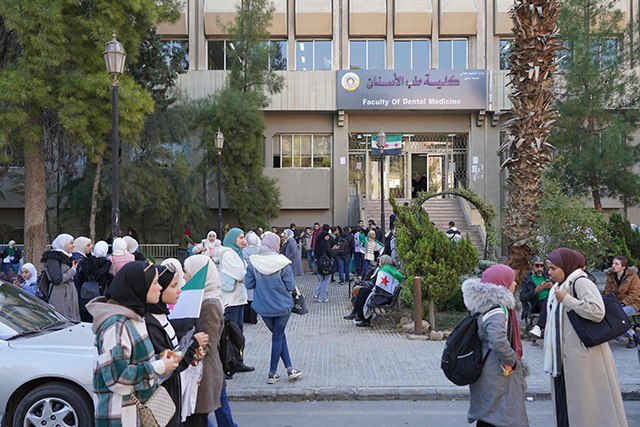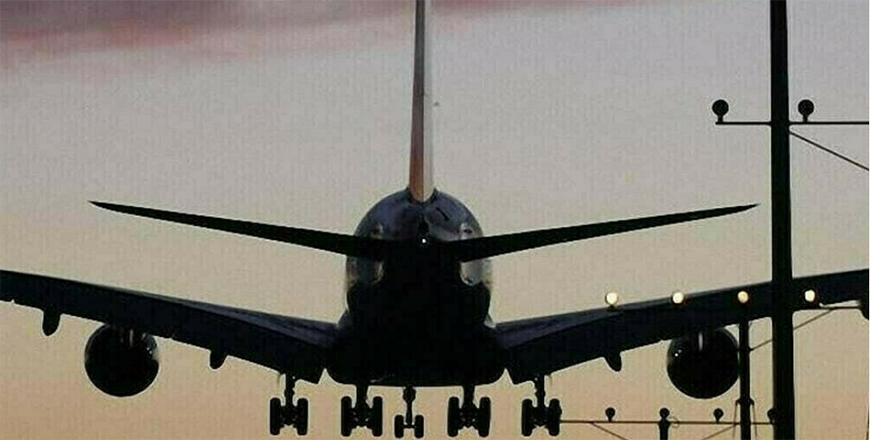You are here
Syria since Assad's overthrow: latest developments
By AFP - Dec 15,2024 - Last updated at Dec 15,2024

Syrian students walk around the campus of the Damascus University in the Syrian capital on December 15, 2024 (AFP photo)
DAMASCUS — It has been a week since rebels Hayat Tahrir al-Sham (HTS) and other rebels toppled long-time strongman Bashar al-Assad.
Here are the main developments on Syria over the past 24 hours:
Schools, universities begin reopening
Uniformed children could be seen returning to school in Syria's Damascus on Sunday, attending class for the first time since Assad's overthrow.
An employee at one school said that "no more than 30 per cent" of schoolchildren were back in class on Sunday, but that "these numbers will rise gradually".
Universities also reopened, but staff says it may take a while for a return to their normal capacity.
Turkey says ready to provide military support
Turkish Defence Minister Yasar Guler said on Sunday his country was ready to provide military support to Syria's new Rebels-led government if it is requested.
He said the new leadership should be given "a chance" and that Turkey was "ready to provide the necessary support" if needed, in remarks reported by state news agency Anadolu and other Turkish media outlets.
Turkey reopened its embassy in Damascus on Saturday, 12 years after the diplomatic mission closed early in Syria's civil war.
Ankara has been a major player in Syria's conflict, financing armed groups in the northwest and maintaining a working relationship with HTS.
Meanwhile, Turkey's interior minister said more than 7,600 Syrian migrants crossed the Turkish border to return home in the five days after Assad's fall.
Turkey is home to nearly three million refugees who fled Syria after the start of the civil war in 2011, with the fall of Assad raising hopes many would return home.
UN envoy in Damascus
United Nations special envoy to Syria Geir Pedersen called for "justice and accountability" in the country, rather than acts of "revenge" after arriving in Damascus on Sunday.
He also called for "increased, immediate" aid to the war-ravaged country.
A Qatari delegation was also due in Syria Sunday to meet transitional government officials for talks on aid and reopening its embassy.
Unlike other Arab states, Qatar never restored diplomatic ties with Assad after a rupture in 2011.
US opens contact with HTS
United States Secretary of State Antony Blinken revealed Saturday that Washington had made contact with Syria's Hayat Tahrir al-Sham rebels, despite previously designating the group as terrorists.
"We've been in contact with HTS and with other parties," Blinken told reporters after talks on Syria in the Jordanian Red Sea resort of Aqaba.
He did not give details on how the contact took place but when asked if the United States reached out directly, he said: "Direct contact, yes."
The United States and other Western governments classify HTS as a terrorist group due to its roots in Al-Qaeda's Syria branch
Blinken said that the easing of US sanctions on Syria imposed during Assad's rule would depend on "sustained action" by the rebel-installed interim government to meet the expectations of the international community.
Main players agree common approach
In Aqaba; the participants in the talks with Blinken issued a joint statement calling for a Syrian-led transition to "produce an inclusive, non-sectarian and representative government formed through a transparent process".
It also stressed "respect for human rights", the importance of combating "terrorism and extremism" and demanded "all parties" cease hostilities in Syria.
HTS says Syria too exhausted for war
HTS leader criticised Israel for its incursion into southern Syria this week but said his country was too exhausted for fresh conflict.
"The Israelis have clearly crossed the disengagement line in Syria, which threatens a new unjustified escalation in the region," he said, adding that despite the violation, "the general exhaustion in Syria after years of war and conflict does not allow us to enter new conflicts."
Israeli troops entered the UN-patrolled buffer zone that separated Israeli and Syrian forces on the Golan Heights last weekend in a move the United Nations said violated the 1974 armistice agreement.
Hizbollah admits Syria supply lines cut
The leader of Iran-backed Hizbollah, Naim Qassem, acknowledged his Lebanese group can no longer be supplied militarily through Syria after Rebels-led rebels toppled its ally Assad.
"Hizbollah lost a military supply line via Syria," Qassem said, adding that "the resistance must adapt to the circumstances".
Related Articles
TEHRAN — Iranian flights to Syria will remain suspended until late January, local media reported Tuesday, after the fall of long time
DAMASCUS — Syria's new leaders said Wednesday they had discussed "transitional justice" with the first Russian official delegation to visit



















